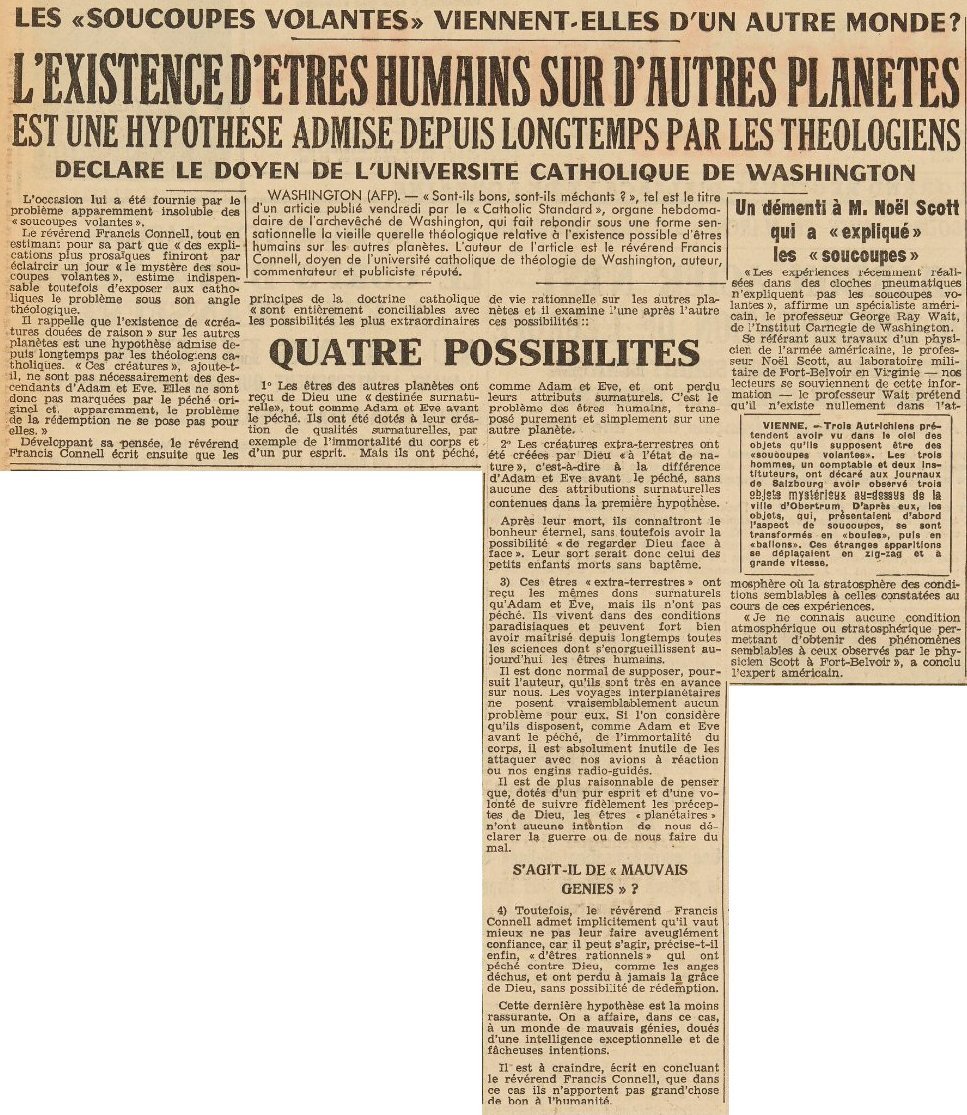The article below was published in the daily newspaper Les Dernières Nouvelles d'Alsace, Strasbourg, France, page 2, on August 10, 1952.

|
WASHINGTON (AFP). -- "Are they good, are they evil?" is the title of an article published Friday in the *Catholic Standard*, the weekly publication of the Archdiocese of Washington, which sensationally revives the age-old theological debate on the possible existence of human beings on other planets. The author is Reverend Francis Connell, Dean of the Catholic University of Theology in Washington, a renowned author, commentator, and publicist.
The occasion was prompted by the seemingly unsolvable problem of "flying saucers."
Reverend Francis Connell, while personally believing that "more mundane explanations will eventually clarify the mystery of flying saucers," nevertheless considers it essential to present the issue to Catholics from a theological perspective.
He recalls that the existence of "rational beings" on other planets has long been an accepted hypothesis among Catholic theologians. "These beings," he adds, "are not necessarily descendants of Adam and Eve. They are therefore not marked by original sin and, apparently, the problem of redemption does not apply to them."
Developing his thought, Reverend Francis Connell writes that the principles of Catholic doctrine regarding rational life on other planets are entirely compatible with Christian belief, and he examines one by one the most extraordinary possibilities:
1° The beings from other planets received from God a supernatural destiny, just like Adam and Eve before the Fall. They were endowed at their creation with supernatural qualities, such as bodily immortality and pure spirit. But they sinned, like Adam and Eve, and lost their natural attributes. It’s the human problem, simply transposed to another planet.
2° The extraterrestrial creatures were created by God "in a state of nature," that is, unlike Adam and Eve before the Fall, without any of the supernatural attributes included in the first hypothesis.
After their death, they would experience eternal happiness, but without the possibility of "seeing God face to face." Their fate would be like that of unbaptized infants who die.
3° These "extraterrestrial" beings received the same supernatural gifts as Adam and Eve, but they did not sin. They live in paradisiacal conditions and may very well have long since mastered all the sciences humanity prides itself on today.
It is therefore reasonable to suppose, the author continues, that they are far ahead of us. Interplanetary travel likely poses no problem for them. If we consider that, like Adam and Eve before the Fall, they possess bodily immortality, then it is completely pointless to attack them with our jet planes or radio-guided weapons.
It is also reasonable to think that, endowed with a pure spirit and a will to faithfully follow God’s commandments, these "planetary" beings have no intention of declaring war on us or doing us harm.
4° However, Reverend Francis Connell implicitly admits that we should not blindly trust them, as they could be, he finally specifies, "rational beings" who sinned against God, like the fallen angels, and have forever lost God’s grace, without any possibility of redemption.
This last hypothesis is the least reassuring. In this case, we are dealing with a world of evil spirits, endowed with exceptional intelligence and harmful intentions.
It is to be feared, concludes Reverend Francis Connell, that in such a case they would bring nothing good to humanity.
"The recently conducted experiments in vacuum bells do not explain flying saucers," asserts an American specialist, Professor George Ray Walt of the Carnegie Institution of Washington.
Referring to the work of an army physicist, Professor Noël Scott, at the military laboratory at Fort Belvoir in Virginia—our readers will recall this report—Professor Walt claims that there are absolutely no conditions in the atmosphere or stratosphere similar to those found during these experiments.
"I know of no atmospheric or stratospheric conditions that would produce phenomena similar to those observed by physicist Scott at Fort Belvoir," the American expert concluded.
VIENNA. -- Three Austrians claim to have seen objects in the sky they believe to be "flying saucers." The three men—a bookkeeper and two schoolteachers—told Salzburg newspapers that they observed three mysterious objects above the town of Obertrum. According to them, the objects, which initially looked like saucers, transformed into "spheres" and then into "balloons." These strange apparitions moved in zigzags and at great speed.